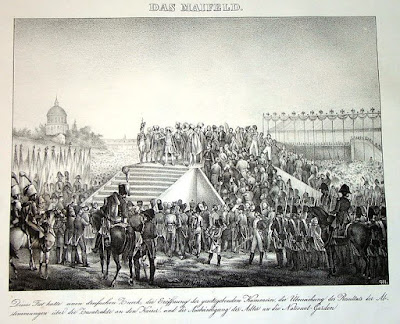Our countdown has been stuck for a while. It's not that nothing was happening, but there were no obvious dramatic highlights. In France, Napoleon had been consolidating his position. He had been active on several fronts. At the grandest level, he had amended the French constitution, extending the suffrage, guaranteeing press and religious freedom and giving real power to an elected Chamber of Representatives. As ever, he was also involved with smaller projects that he believed would benefit the French people. He resumed building the Elephant Fountain at Bastille and the Louvre market at St Germaine. At the distinctly personal level, he was paying court to the 36 year-old Mlle Mars a celebrated Parisienne Actress. He was, as during his previous rule, constantly busy, intervening at all levels of French life, although he was, perhaps, a little less energetic and confident than he had been before his exile. Most of all, though, he was building up his army.
Napoleon's enemies were preparing militarily as well. The British were already established in Belgium. They were to be joined by the Prussians, ready to advance on Paris from the north. Meanwhile the Russian and Austrian armies were preparing to move against France from the east.
On 1 June, 1815, Napoleon decided his armies were ready. A huge review was held in Paris, ostensibly to mark the introduction of the new constitution, but the procession of troops passing Napoleon's reviewing stand took two hours, a display of military power that cannot have been lost on the countries allied against him.
The Allied armies were still moving into position, but France, Napoleon believed, was ready to strike. In two weeks, the Waterloo campaign would begin.


No comments:
Post a Comment